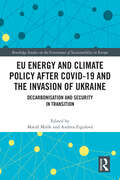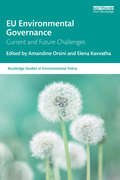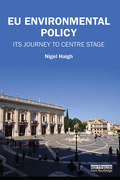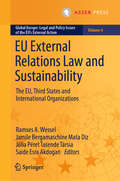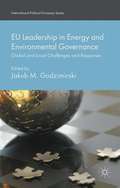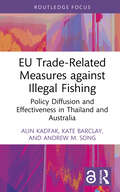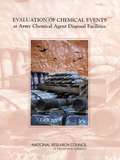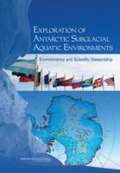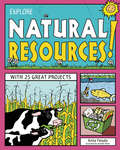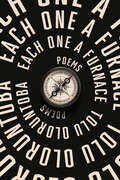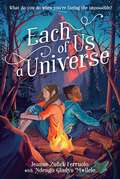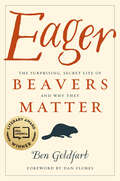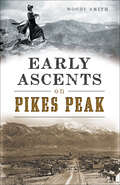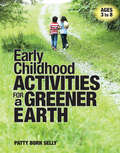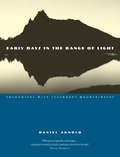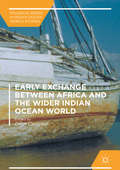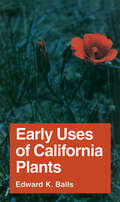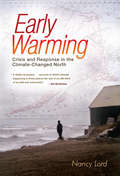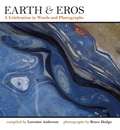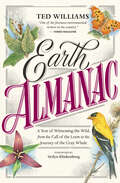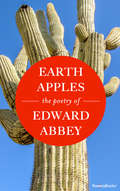- Table View
- List View
EU Energy and Climate Policy after COVID-19 and the Invasion of Ukraine: Decarbonisation and Security in Transition (Routledge Studies on the Governance of Sustainability in Europe)
by Mišík, Edited by MatúšThis book discusses the impact of the COVID-19 pandemic and the Russian invasion of Ukraine on the European Union’s climate and energy policy.By examining the positions of the various actors involved, the book analyses whether the COVID-19 pandemic and the Russian invasion of Ukraine has contributed to greater unity, decarbonisation, and security of energy supply, and if not, whether these crises prompted member states to turn inwards and opt for national solutions to climate and energy challenges. It thus provides a new outlook for EU energy policy in relation to the experience of the two crises.This book will be of key interest to scholars, students and practitioners of climate and energy policy, energy security, EU policy, and more broadly to energy politics, European integration and European Union governance.
EU Environmental Governance: Current and Future Challenges (Routledge Studies in Environmental Policy)
by Amandine Orsini Elena KavvathaThis book presents an overview of the field of environmental law and policies within the European Union, from theoretical foundations to major issues and applied governance solutions. Drawing on expertise from renowned academics and practitioners from different disciplines, EU Environmental Governance: Current and Future Challenges helps readers to understand the main legal, political and economic issues of environmental protection since the adoption of the Paris Agreement by the European Union in 2015, until the 2020 Brexit, European Green Deal and coronavirus outbreak. The authors examine a broad range of sensitive and topical environmental issues including climate change, air pollution, waste management and circular economy, nuclear waste, biodiversity, agriculture, chemicals, nanotechnology, the environmental impacts of trade and environmental conflicts, presenting both current insights and future challenges. Overall, this volume exposes the reader to a vast array of empirical case studies, which will bolster their training and help tackle the environmental challenges faced by Europe today. This book is a valuable resource for students, researchers and policymakers across a broad range of fields, including environmental law and policies, environmental economics, climate science and environmental sociology.
EU Environmental Policy: Its journey to centre stage
by Nigel HaighAt a time when Europeans across the continent are focused on the EU's future direction, this book provides an important contribution to the current debate. Created for reasons quite unconnected with the environment, the EU has been given a compelling new justification by the success of its environmental policy. A number of factors – including a number of threats that came to prominence in the 1980s, and the new concept of 'sustainable development' – are responsible for pushing environmental policy to the forefront of its agenda. Nigel Haigh, a leading authority on the development and implementation of EU environmental policy, traces its evolution from obscurity to centrality. Drawing on a range of articles and lectures, he demonstrates how the EU has not only adapted itself to take on entirely new subject matter, but also has contributed to solving problems which individual Member States could not have dealt with on their own. The book goes on to contextualise the issues throughout its history and offers insight into the future role of the EU in environmental matters. This book is a valuable resource for academics and scholars as well as professionals and policy makers in the areas of environment and sustainability, politics, international relations and European affairs.
EU External Relations Law and Sustainability: The EU, Third States and International Organizations (Global Europe: Legal and Policy Issues of the EU’s External Action #4)
by Ramses A. Wessel Jamile Bergamaschine Mata Diz Júlia Péret Tasende Társia Saide Esra AkdoganThis book delves into the integration of sustainability within the European Union’s external activities, emphasizing the necessity to weave 'sustainability' throughout its relations with third states and international organizations. Unique in its approach, this collective work brings together a diverse range of experts, each contributing a chapter that explores different facets of sustainability in the context of the EU’s increasing external actions. The pressing demands for sustainable development, as outlined in the EU Treaties—specifically Articles 3(5) and 21 of the TEU and Articles 11 and 191 of the TFEU—are examined through a compilation of theoretical analyses, legal dogmatic approaches, and detailed case studies. These contributions aim to offer a cohesive understanding of the legal implications and strategies for embedding sustainability into the EU’s external engagements, providing a multidisciplinary perspective on a critical global issue. Furthermore, the book critically examines how sustainability is operationalized within various EU external policies, providing readers with a deep dive into the mechanisms and outcomes of such integration. It addresses the challenges and opportunities that lie ahead for the EU in maintaining its commitment to sustainability, making it a timely contribution to the discourse on global environmental policy and governance. Designed for scholars, legal practitioners, policymakers, and students interested in European Union law, sustainability, and external relations, this collective work serves as an essential resource. It offers a nuanced perspective on the complexities of legal frameworks that govern the EU’s sustainable external actions and their significant impact on global environmental governance. Ramses A. Wessel is a Professor of European Law at the Faculty of Law of the University of Groningen. Jamile B. Mata Diz is a Professor of International Public Law and Coordinator of the Jean Monnet Center of Excellence of the Federal University of Minas Gerais. Júlia Péret T. Társia is a PhD Candidate at the Federal University of Minas Gerais. Saide Esra Akdogan is a lecturer and researcher at Wageningen University and Research.
EU Leadership in Energy and Environmental Governance: Global And Local Challenges And Responses (International Political Economy Series)
by Jakub M. GodzimirskiThis edited collection focuses on the impact of the changing global distribution of power on the EU's energy policy and ability to project its approach to energy-related issues abroad. It maps the EU's changing position on global energy, the impact of various factors on its energy policy, and its relations with Russia, China, the USA and Brazil.
EU Trade-Related Measures against Illegal Fishing: Policy Diffusion and Effectiveness in Thailand and Australia (Routledge Focus on Environment and Sustainability)
by Kate Barclay Andrew M. Song Alin KadfakFocusing on the experiences of Thailand and Australia, this book examines the impact of trade-restrictive measures as related to the EU’s regulations to prevent Illegal, Unreported and Unregulated (IUU) fishing. It is widely accepted that IUU fishing is harmful, and should be stopped, but there are different approaches to tackling it. Acknowledging this, this book argues that major efforts to fight IUU fishing require careful analyses if the goal is to achieve optimal results and avoid unintended consequences. The book draws on the recent experiences of Thailand and Australia to offer an empirical examination of one increasingly prominent solution, trade-restrictive measures. With Thailand representing direct, active intervention by the EU and Australia a more indirect dispersion of policy narratives and discourses, the book provides a rounded view on how likely it is that different countries in different situations will adapt to the changing policy norms regarding IUU fishing. Understanding the reactions of countries who might be targeted, or otherwise be influenced by the policy, generates new knowledge that helps inform a more effective and scalable implementation of the policy on the part of the EU and a better governance preparedness on the part of non-EU fishing nations. In broader terms, this book exposes a key moment of change in the compatibility between environmental regulations and international trade. The EU IUU policy is a prime example of a policy that uses the mechanisms of international trade to account for environmental and conservation objectives. By way of the unilateral and trade-restrictive stance against IUU fishing, the EU has positioned itself as a major market and normative power, driving its sustainability norms outwards. This book sheds light on the efficacy of this policy setup based on the analysis of country perspectives, which is a key factor influencing its potential spread. This book will be of interest to students and scholars of international fisheries politics, marine conservation, environmental policy and international trade, and will also be of interest to policymakers working in these areas.
EVALUATION OF CHEMICAL EVENTS at Army Chemical Agent Disposal Facilities
by Committee on Evaluation of Chemical Events at Army Chemical Agent Disposal FacilitiesFor over a decade the Army has been carrying out a program aimed at the destruction of accumulated chemical weapons stored at several sites. While destruction by incineration has been successful, several incidents -- called chemical events -- occurred during the disposal process or decontamination activities that raised some public concerns about the safety of operations of three third generation incineration facilities. As a result, the Congress asked the NRC to investigate whether the incidents provide information useful to help ensure safe operation of the future sites. This book presents an analysis of causes of and responses to past chemical events, implications of such events for ongoing and future demilitarization activities, and recommendations for preparing for future events.
EXPLORATION OF ANTARCTIC SUBGLACIAL AQUATIC ENVIRONMENTS: Environmental and Scientific Stewardship
by National Research Council of the National AcademiesAntarctica is renowned for its extreme cold; yet surprisingly, radar measurements have revealed a vast network of lakes, rivers, and streams several kilometers beneath the Antarctic ice sheet. Sealed from Earth's atmosphere for millions of years, they may provide vital information about microbial evolution, the past climate of the Antarctic, and the formation of ice sheets, among other things. The next stage of exploration requires direct sampling of these aquatic systems. However, if sampling is not done cautiously, the environmental integrity and scientific value of these environments could be compromised. At the request of the National Science Foundation, this National Research Council assesses what is needed to responsibly explore subglacial lakes. Exploration of Antarctic Subglacial Aquatic Environments concludes that it is time for research on subglacial lakes to begin, and this research should be guided by internationally agreed upon protocols. The book suggests an initial protocol, which includes full characterization of the lakes by remote sensing, and minimum standards for biological and other types of contamination.
EXPLORE NATURAL RESOURCES!
by Anita Yasuda Jennifer KellerWhat are natural resources? And why is it important to prevent natural resources from being wasted? Explore Natural Resources! answers these questions. The 25 projects inspire young readers ages 6-9 to have fun while learning why natural resources are important to all living things and how every child can take care of the earth's resources through reducing, reusing, and recycling. Kids will read about national parks and early environmentalists, Earth celebrations, and the science behind renewable and nonrenewable resources. With projects and experiments ranging from making a wind-powered car and creating a solar catcher to calculating their water footprint, children will discover that everything comes from the earth. Projects are easy-to-follow, require little adult supervision, and use commonly found household products, many from the recycling box. Through a mixture of fun facts, trivia, jokes, comics, and hands-on activities, kids will Explore Natural Resources! and gain an appreciation of earth's resources, from its vast oceans to its open skies. Explore Natural Resources! meets common core state standards in language arts for reading informational text and literary nonfiction and is aligned with Next Generation Science Standards. Guided Reading Levels and Lexile measurements indicate grade level and text complexity.
Each One a Furnace: Poems
by Tolu OloruntobaFrom the author of The Junta of Happenstance, here is a brilliant new collection of poems—a burning chronicle of passage and stillness and restlessness.Each One a Furnace explores (im)migration, diasporas, transience, and instability by following the behaviour, and abundant variety, of finches. The often-migratory birds in these poems typify the unrest, and inability to rest, that animate the lives of billions in the modern world. Out of the register of ornithology, themes of difficulty, adversity, and migrancy, urban ennui, and the psychic struggles of diasporic peoples take shape as those unable to be at rest in the world take to improbable flight. Trailing the global mobility of birds, in urban and non-urban settings, in historical and contemporary contexts, and through the metaphysical and concrete, Each One a Furnace is a chronicle of struggle within, and between, cultures.
Each of Us a Universe
by Jeanne Zulick Ferruolo Ndengo Gladys MwileloA heartfelt middle grade from Jeanne Zulick Ferruolo about two girls who go on an adventure to the top of a mountain, and learn about each other, themselves, and the magic friendship can bring, perfect for fans of Katherine Applegate and Barbara O'Connor.What do you do when you’re facing the impossible?Ever since the day when everything changed, Cal Scott’s answer has been to run—run from her mother who’s fighting cancer, run from her father whom she can’t forgive, and run from classmates who’ve never seemed to “get” her anyway. The only thing Cal runs toward is nearby Mt. Meteorite, named for the magical meteorite some say crashed there fifty years ago. Cal spends her afternoons plotting to summit the mountain, so she can find the magic she believes will make the impossible possible and heal her mother. But no one has successfully reached its peak—no one who’s lived to tell about it, anyway.Then Cal meets Rosine Kanambe, a girl who’s faced more impossibles than anyone should have to. Rosine has her own secret plan for the mountain and its magic, and convinces Cal they can summit its peak if they work together. As the girls climb high and dig deep to face the mountain’s challenges, Cal learns from Rosine what real courage looks like, and begins to wonder if the magic she’s been looking for is really the kind she needs.Each of Us a Universe by Jeanne Zulick Ferruolo is a glowing story of friendship, inner strength, and what happens when the impossible becomes possible.
Eager: The Surprising, Secret Life of Beavers and Why They Matter
by Ben GoldfarbWINNER of the 2019 PEN/E.O. Wilson Literary Science Writing AwardAuthor of the New York Times 2023 &“Notable Book&” CrossingsWashington Post &“50 Notable Works of Nonfiction&”Science News &“Favorite Science Books of 2018&”Booklist &“Top Ten Science/Technology Book of 2018&”&“A marvelously humor-laced page-turner about the science of semi-aquatic rodents…. A masterpiece of a treatise on the natural world.&”—The Washington PostIn Eager, environmental journalist Ben Goldfarb reveals that our modern idea of what a healthy landscape looks like and how it functions is wrong, distorted by the fur trade that once trapped out millions of beavers from North America&’s lakes and rivers. The consequences of losing beavers were profound: streams eroded, wetlands dried up, and species from salmon to swans lost vital habitat. Today, a growing coalition of &“Beaver Believers&”—including scientists, ranchers, and passionate citizens—recognizes that ecosystems with beavers are far healthier, for humans and non-humans alike, than those without them. From the Nevada deserts to the Scottish highlands, Believers are now hard at work restoring these industrious rodents to their former haunts. Eager is a powerful story about one of the world&’s most influential species, how North America was colonized, how our landscapes have changed over the centuries, and how beavers can help us fight drought, flooding, wildfire, extinction, and the ravages of climate change. Ultimately, it&’s about how we can learn to coexist, harmoniously and even beneficially, with our fellow travelers on this planet.
Eagle Rock Reservation (Images of America)
by Joseph FaganFounded in 1895, the Essex County Park Commission was the first county park system in the nation. That year, the commission began its management of Eagle Rock. The reservation was designed by renowned architect Frederick Law Olmsted Sr., who also designed Central Park in New York City and the Capitol Grounds in Washington, D.C. Evident characteristics of the architect within the park are the winding roads, natural blended waterways, open fields, and overlooks, all of which combine to attract thousands of visitors each year. Eagle Rock Reservation explores many interesting and little-known facts about the park. Readers are introduced to Llewellyn Haskell, the founder of nearby Llewellyn Park, who first purchased land at Eagle Rock. Seen is the trolley that once served Eagle Rock as it emerged as a popular resort area. Included are the park's view of the New York City skyline and the Hundred Steps to Eagle Rock, the same steps that were ascended by visitors nearly one hundred years ago. Also seen is a never-before-published lab note written by Thomas Edison, documenting World War I experiments he conducted for the U.S. Navy at Eagle Rock.
Early Ascents on Pikes Peak (American Chronicles Ser.)
by Woody SmithAn intriguing, firsthand look at what it was like to ascend the storied Colorado mountain and experience its allure in the early days of the Old West. Magnificent Pikes Peak rises dramatically from the Colorado prairie to a height of 14,114 feet above sea level. Visible for one hundred miles around, the granite giant&’s magnetic appeal compelled rugged mountaineers more than a century ago to risk loose saddles, electrical storms and even murder on treacherous expeditions to the summit. First known as Long Mountain by the Indigenous peoples who sojourned at its hot springs, Pikes Peak was a full-fledged tourist destination by the 1870s. Eager men and women ventured up and down by foot, horse, burro, stagecoach, rail and bicycle. Colorado Mountain Club historian Woody Smith captures the news of the era to recount the thrill of pioneer days on America&’s most famous mountain.
Early Childhood Activities for a Greener Earth
by Patty Born SellyMore than 100 classroom activities to help children learn about and care for the earthEducate young children about the environment through experience and play. These activities encourage children to develop a sense of wonder, curiosity, and joy for nature. Each chapter focuses on a common and important environmental topic-from waste reduction and recycling to air quality, weather and climate change, and energy reduction-and provides information to help you present these topics to children in developmentally appropriate ways. Early Childhood Activities for a Greener Earth will help you excite children, engage families, and encourage your community to be green.Early Childhood Activities for a Greener Earth is a 2014 Teachers' Choice Award for the Classroom winner!
Early Days in the Range of Light: Encounters with Legendary Mountaineers
by Daniel ArnoldIt's 1873. Gore-Tex shells and aluminum climbing gear are a century away, but the high mountains still demand your attention. Imagine the stone in your hands and thousands of feet of open air below you, with only a wool jacket to weather a storm and no rope to catch a fall. Daniel Arnold did more than imagine - he spent three years retracing the steps of his climbing forefathers, and in Early Days in the Range of Light, he tells their riveting stories. From 1864 to 1931, the Sierra Nevada witnessed some of the most audacious climbing of all time. In the spirit of his predecessors, Arnold carried only rudimentary equipment - no ropes, no harness, no specialized climbing shoes. Sometimes he left his backpack and sleeping bag behind as well, and, like John Muir, traveled for days with only a few pounds of food rolled into a sack slung over his shoulder.In an artful blend of history, biography, nature, and adventure writing, Arnold brings to life the journeys and the terrain traveled. In the process he uncovers the motivations that drove an extraordinary group of individuals to risk so much for airy summits and close contact with bare stone and snow.
Early Events in Monocot Evolution
by Paul Wilkin Simon J. MayoTracing the evolution of one of the most ancient major branches of flowering plants, this is a wide-ranging survey of state-of-the-art research on the early clades of the monocot phylogenetic tree. It explores a series of broad but linked themes, providing for the first time a detailed and coherent view of the taxa of the early monocot lineages, how they diversified and their importance in monocots as a whole. Featuring contributions from leaders in the field, the chapters trace the evolution of the monocots from largely aquatic ancestors. Topics covered include the rapidly advancing field of monocot fossils, aquatic adaptations in pollen and anther structure and pollination strategies and floral developmental morphology. The book also presents a new plastid sequence analysis of early monocots and a review of monocot phylogeny as a whole, placing in an evolutionary context a plant group of major ecological, economic and horticultural importance.
Early Exchange between Africa and the Wider Indian Ocean World
by Gwyn CampbellThis volume comprises a selection of essays by scholars from a variety of disciplines that discuss the exchange relationship between Africa and the wider Indian Ocean world (IOW), a macro-region running from East Africa to China, from early times to about 1300 CE. The rationale for regarding this macro-region as a "world" is the central significance of the monsoon system which facilitated the early emergence of long-distance trans-IOW maritime exchange of commodities, peoples, plants, animals, technologies and ideas.
Early Exchange between Africa and the Wider Indian Ocean World (Palgrave Series in Indian Ocean World Studies)
by Gwyn CampbellThis volume comprises a selection of essays by scholars from a variety of disciplines that discuss the exchange relationship between Africa and the wider Indian Ocean world (IOW), a macro-region running from East Africa to China, from early times to about 1300 CE. The rationale for regarding this macro-region as a “world” is the central significance of the monsoon system which facilitated the early emergence of long-distance trans-IOW maritime exchange of commodities, peoples, plants, animals, technologies and ideas.
Early Uses of California Plants (California Natural History Guides #10)
by Edward K. BallsInformation from many sources has been compiled here to present the most important uses of plants by early inhabitants of California, as well as methods of preparing the plants for use. The Indian method of leaching acorn meal so it could be eaten, the medicinal value of Yerba Mansa, the use of other plants for making baskets, rope, and clothing, are some of the subjects treated.
Early Warming: Crisis and Response in the Climate-Changed North
by Nancy LordIn Shishmaref, Alaska, new seawalls are constructed while residents navigate the many practical and bureaucratic obstacles to moving their entire island village to higher ground. Farther south, inland hunters and fishermen set out to grow more of their own food-and to support the reintroduction of wood bison, an ancient species well suited to expected habitat changes. First Nations people in Canada team with conservationists to protect land for both local use and environmental resilience.In Early Warming, Nancy Lord takes a cutting-edge look at how communities in the North-where global warming is amplified and climate-change effects are most immediate-are responding with desperation and creativity. This beautifully written and measured narrative takes us deep into regions where the indigenous people who face life-threatening change also demonstrate impressive conservation ethics and adaptive capacities. Underpinned by a long acquaintance with the North and backed with scientific and political sophistication, Lord's vivid account brings the challenges ahead for us all into ice-water clarity.
Earth & Eros
by Robert Michael Pyle Lorraine Anderson Bruce HodgeIn the tradition of The Sense of Wonder by Rachel Carson and On the Loose by Terry and Renny Russell, Earth & Eros combines words and photographs to inspire readers to deepen their connection with the good Earth. The book awakens readers to the full force of eros - life force that connects us to our bodies, other humans, all living beings, and the Earth as a living being.Intended as an antidote to an age obsessed by speed, screens, and machines, this book brings together previously published prose and poetry with 25 fine art landscape photographs to explore the sacred erotic dimension of humans' relationship to the Earth.The writings in Earth & Eros were chosen for their brevity, readability, beauty, and potency, and the photographs for their sensuality. Readers engage with writers such as David James Duncan, Hart Crane, Diane Ackerman, Sherman Alexie, D. H. Lawrence, Mary Oliver, and Pablo Neruda. Some of the pieces of writing are explicitly sexual, while others appreciate the sensuality of tree limbs, seeping water, mushrooms, and ferns. Earth and Eros is beautifully produced and a pleasure to hold and to look at, a book to read and reread slowly, out loud.
Earth Alert! (Girl Talk #14)
by L. E. BlairThe earth is in trouble, but we can save it! Kids at Bradley Junior High can make a difference. Kids all over the world can make a difference!" --says Allison Cloud, speaking at the Earth Alert Fair. When Allison is elected chairperson of the seventh-grade Earth Alert Fair, she's determined to get the kids at Bradley Junior High concerned about the earth. But things almost turn into a disaster when Stacy the Great decides that she wants to run the fair--her way! Stacy spends the money for the fair on a roller coaster and ferris wheel which are energy hogs. Will anyone want to come to the fair Allison and her friends have planned with Native American games and natural foods? And there's something else on Allison's mind. The new kid from California flirts with her and asks her on a date and Billy, the kid she really likes, isn't speaking to her. Find out what goes on in seventh grade. Look for the other Girl Talk books in the Bookshare collection.
Earth Almanac: A Year of Witnessing the Wild, from the Call of the Loon to the Journey of the Gray Whale
by Ted WilliamsNoted nature writer Ted Williams invites readers along on a year-long immersion in the wild and fleeting moments of the natural world, from winter candy and spring quackers to summer&’s scarlet farewell and autumn reveilles. This beautifully crafted collection of short, seasonal essays combines in-depth information with evocative descriptions of nature&’s marvels and mysteries. Williams explains the weather conditions that bring out the brightest reds in autumn leaves, how hungry wolf spiders catch their prey, and why American goldfinches wait until late July or August to build their nests. In the tradition of Thoreau, Carson, and Leopold, Ted Williams&’s writing stands as a testament to the delicate balance of nature&’s resilience and fragility, and inspires readers to experience the natural world for themselves and to become advocates for protecting and preserving the amazing diversity and activity found there.
Earth Apples: The Poetry of Edward Abbey
by Edward AbbeyPoems about love and landscapes by the author of the classic Desert Solitaire, an &“environmentalist, nature writer, novelist and all-around iconoclast&” (The New York Times). While better known for his nature writing and his comic classic The Monkey Wrench Gang, Edward Abbey was also an enthusiastic creator of verse. The New York Times called his memoir Desert Solitaire &“deeply poetic&”—and now Earth Apples gives us his actual poetry, in Abbey&’s first and only collection. Whether writing about vast desert landscapes, New York City, or a love of bawdy women, Abbey's verse is eloquent, irreverent, and unapologetically passionate. The poems gathered here, published digitally for the first time, are culled from Abbey&’s journals and give an insightful and unique glance into the mind of this literary legend.
